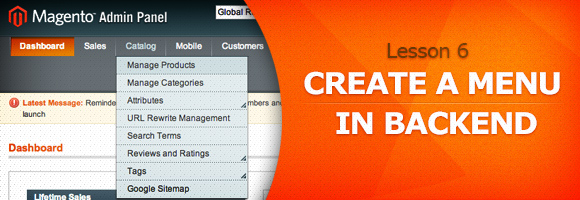Say Hello to October and welcome back to Magento Tutorial by Magestore!
Let’s continue Lesson 6. In part 1, we have learned how to add a Magento menu in backend. Today in part 2, we will learn how to create a Magento controller action in backend.
Let’s go!
1. Declare a router in file config.xml
File app\code\local\Magestore\Lesson06\etc\config.xml
Overall configuration:
<admin> <routers> <adminhtml> <args> <modules> <[Namespace]_[Modulename]_[Adminhtml] > [Namespace]_[Modulename]_Adminhtml</[Namespace]_[Modulename]_[Adminhtml]> </modules> </args> </adminhtml> </routers> </admin>
Example:
<admin> <routers> <lesson06admin> <use>admin</use> <args> <module>Magestore_Lesson06</module> <frontName>lesson06admin</frontName> </args> </lesson06admin> </routers> </admin>
– <admin> and <routers> are the parent nodes. 1 can be either
• <admin> : for admin routers
• <frontend> : for frontend routers
– <lesson06admin>: The name of your module in lowercase. You can indicate a name that is already in use (for example adminthml) only if you want to extend the configuration of that route with a child entry in <modules> node (see below). Other settings will not be rewritten or may even cause errors.
– <args> : node can contain three different types of arguments;
– <module> : contains the full name of your module including package (Packagename_Modulename). The system will then look for controllers in the controllers directory of the module you indicated.
– <frontName> : sets the router name as it will be included in the URL: /frontname/controller/action like /lesson06admin/ adminhtml_testbymagestore/index/key/69a015b1c7b4151122e352de306e1d0c/
2. Link structure in Magento
• In backend:
Example : /lesson06admin/adminhtml_lesson06/view
in which:
– lesson06admin: is the adminhtml router.
– adminhtml_lesson06: is the controller name requested in backend (in folder adminhtml).
– view: is the action in controller lesson06 requested.
• In frontend:
Example: /lesson06/ lesson06/view
in which:
– lesson06: is the frontend router.
– lesson06: is the controller requested in frontend.
– view: is the action in the controller lesson06 requested.
3. Controller for each menu
• Add controllers for each menu
Example
File app\code\local\Magestore\Lesson06\etc\adminhtml.xml
<?xml version="1.0"?> <config> <menu> <lesson06 module="lesson06" translate="title"> <title>Lesson06</title> <sort_order>71</sort_order> <children> <lesson06 module="lesson06" translate="title"> <title>Manage Items</title> <sort_order>0</sort_order> <action> lesson06admin/adminhtml_lesson06 </action> </lesson06> . . . </menu> </config>
File controller : app\code\local\Magestore\Lesson06\controllers\Adminhtml\Lesson06Controller.php
<?php
class Magestore_Lesson06_Adminhtml_Lesson06Controller extends Mage_Adminhtml_Controller_Action
{
protected function _initAction()
{
$this->loadLayout()
->_setActiveMenu('lesson06/lesson06')
->_addBreadcrumb(
Mage::helper('adminhtml')->__('Items Manager'),
Mage::helper('adminhtml')->__('Item Manager')
);
return $this;
}
public function indexAction()
{
$this->_initAction()
->renderLayout();
}
}
Example 2:
File app\code\local\Magestore\Lesson06\etc\adminhtml.xml
<?xml version="1.0"?> <config> <menu> <lesson06 module="lesson06" translate="title"> <title>Lesson06</title> <sort_order>71</sort_order> <children> <lesson06 module="lesson06" translate="title"> <title>Test Action Menu</title> <sort_order>1</sort_order> <action> lesson06admin/adminhtml_lesson06/test </action> </lesson06>
URL of action menu:
File controller : app\code\local\Magestore\Lesson06\controllers\Adminhtml\Lesson06Controller.php
<?php
class Magestore_Lesson06_Adminhtml_Lesson06Controller extends Mage_Adminhtml_Controller_Action
{
public function testAction(){
$block = $this->getLayout()-> createBlock('adminhtml/template')-> setTemplate('lesson06/test/rendertesttemplate.phtml');
echo $block->toHtml();
}
protected function _isAllowed()
{
return Mage::getSingleton('admin/session')->isAllowed('lesson06');
}
Here is the end of Lesson 6 – Create a Magento Controller action in backend of Magento Open Course series. We will turn to Lesson 7 soon. Follow us in Magento Open Course for Magento Tutorial.
See you again.





1 Comment
Amazing Blog.